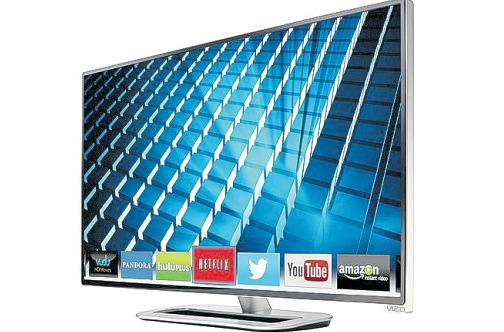You may have already been aware that smart TVs collect data on their users, sometimes without their viewers’ knowledge. But how is this data used?
While some claim that it is only used to boost user experience, one smart TV manufaturer was recently fined a huge sum for spying on customers and selling that data to outside sources.

Television manufacturer Vizio and a subsidiary have been ordered to pay US$2.5 million to settle allegations that they secretly tracked consumers’ viewing habits and sold the information to marketing companies and data brokers.
The settlement, announced recently, ends investigations conducted by US state authorities and the Federal Trade Commission (FTC) into the use of data-collecting technology on Vizio’s smart TVs.
To settle the case, Vizio has agreed to stop unauthorised tracking, to prominently disclose its TV-viewing collection practices, and to get consumers’ express consent before collecting and sharing viewing information, the FTC said.
In addition, the company must delete all data it collected before March 2016, and put a privacy programme in place that evaluates Vizio’s practices and its partners.
They will pay US$1.5 million to the FTC while the state will receive US$1 million. If Vizio complies with the agreement however, the state will suspend US$300,000 in civil penalties included in its settlement amount.
The FTC reported on its website that consumers have bought more than 11 million Internet-connected Vizio televisions since 2010, but what they didn’t know was that while they were watching their TV it was also watching them.
Starting in 2014, Vizio made TVs that automatically tracked what consumers were watching and transmitted that data back to its servers. The television manufacturer put its tracking functionality behind a setting called ‘smart interactivity,’ the FTC added.
Securing your viewing privacy
Now that Vizio has been caught spying on its users, it might be time for other smart TV owners to consider the privacy of their TV viewing.
After all, other manufacturers collect data, but Vizio is the only one known to have sold that information to outside services without viewers’ consent.
One of the easiest ways, to block a smart TV from tracking your activities is to just disconnect it from the Internet, which would take away the ‘smart’ element and make it just a plain TV. Not the best solution?
A better option is to disable ‘tracking’ and similar settings on your device. This way you’ll still be able to enjoy the ‘smart’ element of your TV. Each television manufacturer has their own privacy policy and options for disabling tracking functions.
Vizio said that tracking has already been disabled on smart TV models before 2011. However, if you are not sure, you can go open settings from your TV menu, select ‘smart interactivity’ and ensure that it is turned off.
For users with newer models however, disabling the smart interactivity feature requires going to settings in the TV menu, selecting ‘system’ followed by ‘reset’ and ‘admin’, then scrolling down to smart interactivity and switching it off.
For other brands of smart TV sets, which could also be spying on its viewers, DigIT recommends reading the manufacturer’s privacy policy and checking your menu settings to turn off tracking and/or similar features.
Samsung, for example, recently changed its privacy policy for smart TVs after privacy concerns were raised about its voice recognition feature.
It previously warned that customers should “be aware that if your spoken words include personal or other sensitive information, that information will be among the data captured and transmitted to a third party through your use of Voice Recognition”.
However, in its revised policy, the company detailed: “If you enable voice recognition, you can interact with your Smart TV using your voice. To provide you the voice recognition feature, some interactive voice commands may be transmitted (along with information about your device, including device identifiers) to a third-party service provider (currently, Nuance Communications, Inc) that converts your interactive voice commands to text and, to the extent necessary, to provide the voice recognition features to you.
“In addition, Samsung may collect and your device may capture voice commands and associated texts so that we can provide you with voice recognition features and evaluate and improve the features. Samsung will collect your interactive voice commands only when you make a specific search request to the smart TV by clicking the activation button, either on the remote control or on your screen, and speaking into the microphone on the remote control.”
The Korean electronics giant also outlined other features such as gesture controls and facial recognition, and encouraged users to visit the settings menu to turn off undesired features.
It however noted features that will or will not work with each function that is disabled.










